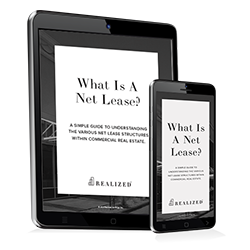Page 4 31 - 40 of 98
What Is The Cap Rate For Net Lease Properties?

New real estate investors transitioning from property ownership to passive investments through net-leased properties should start by asking about the cap rate.
What Is A Net Lease Strategy?

Investment property owners often aim to reduce management burdens, generate reliable income, and preserve property value for long-term sustainability. One approach some investors consider is the Net Lease Strategy, which may address these objectives depending on the lease structure and tenant profile.
Double-Net Lease: What It Is, How It Works, Triple Net Difference

Commercial real estate lease contracts come in a few variations, and one of these is the double-net lease. Through this arrangement, the tenant and landlord have similar proportions of financial responsibility, making this option attractive to investors who want a balance of income and costs. How does a double-net lease work? How does this compare to triple net leases? Below, Realized 1031 has shared a guide explaining this arrangement, its pros and cons, and more.
Absolute Net Lease: What It Is and How It Works

Acquiring and renting out an investment property means entering lease agreements with tenants. Those agreements range from gross leases (in which the tenant pays a fixed rent, and you pay all property operating costs) to a triple net lease (in which the tenant pays the fixed rent, plus insurance, taxes, and maintenance).
The Factors Impacting NNN Property Returns

A triple-net lease (NNN) real estate property can provide steady passive income with minimal landlord responsibilities. However, a triple-net arrangement doesn’t guarantee automatic returns. Many factors are involved in the success of a NNN arrangement.
Keys to Improving NNN Investment Success

A triple net lease (NNN) property can be an excellent investment choice if you’re looking for real estate that can provide potentially stable passive income. This arrangement can offer many benefits, including reduced responsibilities, operating costs, and overall management.
How Long Do Triple Net Leases (NNN) Last?

Triple-net leased (NNN) properties can be suitable investments if you’re looking for real estate that offers potentially stable cash flow and minimal management. This is because a triple net tenant is responsible for property taxes, insurance costs, maintenance expenses, and rent.
What Are The Disadvantages Of Triple Net Lease (NNN) Investments?

Triple net lease (NNN) properties can be an attractive addition to your real estate investment portfolio. Because the tenant pays for property taxes, insurance, and maintenance under an NNN agreement, this real estate can generate steady income streams without headaches related to property management.
What is a Triple Net (NNN) Lease REIT? A Guide for Investment Property Owners.
.jpg?width=2121&height=1414&name=iStock-479842074%20(1).jpg)
Many investment property owners seek to diversify their portfolios, reduce their management burdens, and at the same time, achieve steady streams of income. One solution that can meet these requirements is the Triple Net (NNN) Lease REIT. In this blog, we will learn what a Triple Net Lease (NNN) REIT is, how it works, and whether it would suit your investment plan.
Triple Net Lease (NNN): What It Is And How It Works

Lease structures are essential in real estate investments. These contracts serve as the foundation for property agreements and can determine who pays for what, how each party manages costs, and how tenants or landlords handle long-term financial obligations. One lease structure that has become popular in recent years is the triple net lease agreement or NNN lease. You’ll typically find such arrangements in commercial properties, such as retail stores and office buildings.
Page 4 31 - 40 of 98


